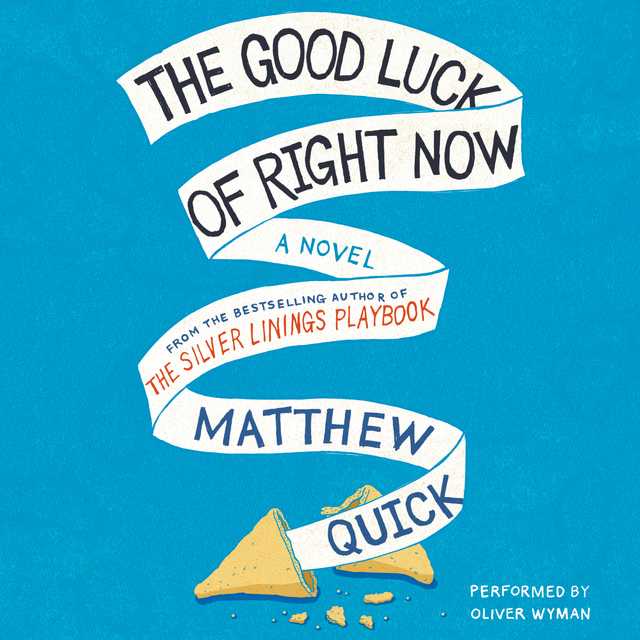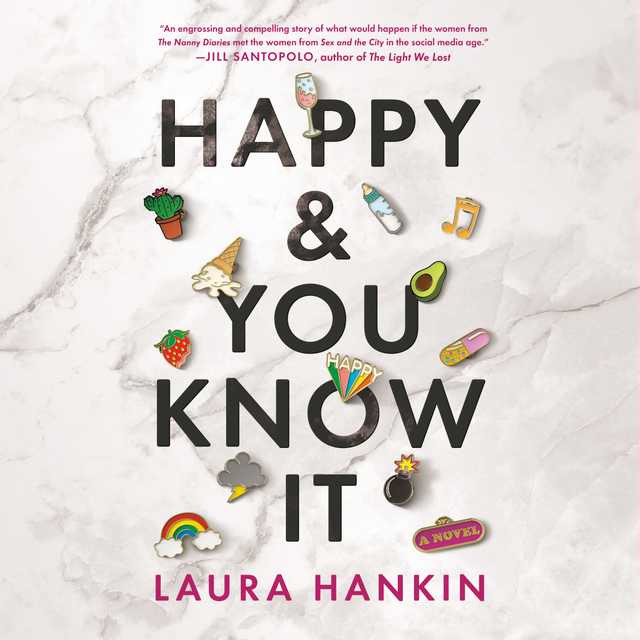The Good Luck of Right Now Audiobook Summary
From Matthew Quick, the New York Times bestselling author of The Silver Linings Playbook, comes The Good Luck of Right Now, a funny and tender story about family, friendship, grief, acceptance, and Richard Gere–an entertaining and inspiring tale that will leave you pondering the rhythms of the universe and marveling at the power of kindness and love.
For thirty-eight years, Bartholomew Neil has lived with his mother. When she gets sick and dies, he has no idea how to be on his own. His redheaded grief counselor, Wendy, says he needs to find his flock and leave the nest. But how does a man whose whole life has been grounded in his mom, Saturday mass, and the library learn how to fly?
Bartholomew thinks he’s found a clue when he discovers a “Free Tibet” letter from Richard Gere hidden in his mother’s underwear drawer. In her final days, mom called him Richard–there must be a cosmic connection. Believing that the actor is meant to help him, Bartholomew awkwardly starts his new life, writing Richard Gere a series of highly intimate letters. Jung and the Dalai Lama, philosophy and faith, alien abduction and cat telepathy, the Catholic Church and the mystery of women are all explored in his soul-baring epistles. But mostly the letters reveal one man’s heartbreakingly earnest attempt to assemble a family of his own.
A struggling priest, a “Girlbrarian,” her feline-loving, foul-mouthed brother, and the spirit of Richard Gere join the quest to help Bartholomew. In a rented Ford Focus, they travel to Canada to see the cat Parliament and find his biological father . . . and discover so much more.
Other Top Audiobooks
The Good Luck of Right Now Audiobook Narrator
Oliver Wyman is the narrator of The Good Luck of Right Now audiobook that was written by Matthew Quick
About the Author(s) of The Good Luck of Right Now
Matthew Quick is the author of The Good Luck of Right Now
More From the Same
- Author : Matthew Quick
- Every Exquisite Thing
- The Reason You’re Alive
- Forgive Me, Leonard Peacock
- Love May Fail
- Sorta Like A Rock Star
- Publisher : HarperAudio
- Abraham
- American Gods [TV Tie-In]
- Dead Ringer
- House of Sand and Fog
- Prey
The Good Luck of Right Now Full Details
| Narrator | Oliver Wyman |
| Length | 7 hours 51 minutes |
| Author | Matthew Quick |
| Category | |
| Publisher | HarperAudio |
| Release date | February 11, 2014 |
| ISBN | 9780062308702 |
Additional info
The publisher of the The Good Luck of Right Now is HarperAudio. The imprint is HarperAudio. It is supplied by HarperAudio. The ISBN-13 is 9780062308702.
Global Availability
This book is only available in the United States.
Goodreads Reviews
Will
February 23, 2022
I wondered if faith were not a form of pretending You’re in Luck! Matthew Quick, author of The Silver Linings Playbook, has written an incredibly moving story, populated with his usual range of damaged, quirky, lovable characters, but containing a core of significant philosophical substance. A man called “Q” Bartholomew Neil is 38 years old. He keeps a journal of interesting things. He has never held a job. He has lived with his mother all his life, and the two have always shared a close bond. His father has never really been in the picture. Bartholomew can probably be found somewhere on the autism scale. Although he has never spoken to her, he is smitten with a young lady at his local library. He calls her the Girlbrarian. He has an angry man in his stomach who keeps telling him awful things. He has no friends, but he has a young grief counselor, although she has troubles of her own. After a prolonged illness, Mom passed away. For the first time in his life, Bartholomew must take care of himself, a fledgling who needs to grow a pair…of wings.The Good Luck of Right Now is the story of how Bartholomew creates a new family/home/life/nest for himself out of the shards of the past and the flotsam of the present. The cast’s oddities are based in their personalities and in their troubles, and there is plenty of damage to go around. Mom is, well, dead. Not much to be done about that. Father McNamee is not just their local parish priest, but a close friend of the family. The padre has issues of his own, and after not hearing God speaking to him for a stretch, decides, from the pulpit, to chuck the collar, and pursue what he believes to be his personal mission from God. And he’s not even one of these guys. from WikimediaIf Father McNamee is not enough, how about Bartholemew’s new friend, Max, who charmingly uses expletives as adjectives, nouns, and verbs, particularly the f-bomb, and has issues with paranoia, particularly as it pertains to therapists who may or may not be alien abductors.The Girlbrarian completes the core cast, a quiet, but very dedicated library worker, several steps further outside the norm than that other librarian you may have heard of. She is very retiring, and with good reasonThe story is told by Bartholomew, writing letters to his more or less imaginary friend, Richard Gere (think Woody Allen in Play it Again, Sam). Mom had been a huge fan, and in her waning days imagined that Bartholomew was someone other than who he was. Bartholomew played along, pretending, for her sake. Now, he writes to Gere as if they were buds, telling him about his life and ongoing challenges. from www.japanese-buddhism.comHe may never have taken care of himself before. He may begin this journey friendless. He may communicate with a person who has no idea he is alive. He may have more than his share of oddities, but Bartholomew is a good egg with an outsized heart, an admirable openness and an eagerness to learn, and to help others.But there is so much more than quirkiness and warmth to this novel. As with Silver Linings, there is consideration for how one faces the downsides of our existence. Is there some sort of balance in the universe? What is worth dismissing and what is worth believing in? And can believing, or pretending make it so? Where does delusion leave off and faith begin? Like the haloed saints depicted in stained glass at Saint Gabriel’s, Mom seemed to be guided by divinity. Her madness appeared holy. She was bathed in light. Some part of Bartholomew believes that Richard Gere cosmically reads the letters he writes. And a part of his affection for Gere has to do with Gere’s Buddhism and alliance with the Dalai Lama. His one-sided communications are reminiscent of how the prayerful might feel about a favored saint. Father McNamee believes that God has spoken to him, and hopes He will again. He spends long hours on his knees, in prayer. Max believes in aliens, and swearing. Others believe that bad and hurt people will get better with counseling.Lest one think there is nothing but sunshine here, let me disabuse you of the notion. Bartholomew has come in for the sort of treatment one might expect from moron bullies confronted with the unfamiliar. His home has been the object of unpleasantness as well. In fact there is a fair bit of abuse across the cast of characters here, all off-screen. It is how they cope with life’s challenges that is at issue, not the obstacles per se.You might want to keep an eye out for avian references. I counted thirteen, but stopped counting after a point. They permeate, and work well to illuminate character and events. And if you are fond of cats, there is one scene in particular that is at least as uplifting as a good scratch behind the ears. My nominee for a star turn in the role of Max's cat, Alice, is the female who shares my bed almost every day, the sultry calico, MadisonToss in some human organs on public display, and peculiar therapeutic environments for good measure. Charles Guiteau’s brainBrother Andre’s Heart from HolyCrossUsa.org What’s not to like? Very little. There is an event in which Bartholomew’s advisor offers guidance that seemed to me outside the realm of the likely. Just what the Good Luck of Right Now consists of is explained in the book. It has to do, generically, with there being some balance in the universe, but I will not dump details here. I must say, though, that, I do not think this particular philosophical view stands up to close scrutiny, at least not to mine. Yet it certainly is an uplifting, and comforting way of looking at the world, and very much informs the characters and actions of this tale. One can look at the world through one’s own lens and still appreciate the landscape as seen through Quick’s.This book is a delight, well-paced, moving, (yes, you will need tissues) and content-rich. You might even feel, when you get around to reading this, that your luck will have taken a turn for the better. Published - February 11, 2014 ==============================EXTRA STUFFLinks to the author’s personal, Twitter and FB pagesCanadian Parliamentary Cats - (view spoiler)[OK. This is not really a spoiler, but I wanted to include this stuff and thought it would clutter up the review even more than I have already done. The Cats of Parliament Hill figure in the story. I will refer you to the Wikipedia pagefor that history. Don’t worry. You will not spoil anything about the book by reading this.Here is a particularly wonderful FB page if you want to see more shots of the place and it’s erstwhile inhabitants. Sadly, it was shut down, (the place, not the website) as of January 2013. So here is a sample of shots from that page. Cat posseOne of the cats of Parliament HillStanding Guard- well lying down, actually (hide spoiler)]Here's a video of Q talking about the book2/12/14 - Here is a radio interview of Q by local radio institution Leonard Lopate - most definitely worth a listenFull, well, partial, well, at least a little disclosureWhile I can be bought, this review is not evidence of the fact. I received the ARE from my Book Goddess (no, not Madison) who works at HarperCollins. The opinions expressed here are mine alone.["br"]>["br"]>["br"]>["br"]>["br"]>["br"]>["br"]>["br"]>["br"]>["br"]>["br"]>["br"]>["br"]>["br"]>["br"]>["br"]>["br"]>["br"]>["br"]>["br"]>["br"]>["br"]>["br"]>["br"]>["br"]>["br"]>["br"]>["br"]>["br"]>["br"]>["br"]>["br"]>["br"]>["br"]>["br"]>["br"]>["br"]>["br"]>["br"]>["br"]>["br"]>["br"]>["br"]>["br"]>["br"]>["br"]>["br"]>["br"]>["br"]>["br"]>["br"]>["br"]>["br"]>["br"]>["br"]>["br"]>["br"]>["br"]>["br"]>["br"]>["br"]>["br"]>["br"]>["br"]>["br"]>["br"]>["br"]>["br"]>["br"]>["br"]>["br"]>["br"]>["br"]>["br"]>["br"]>["br"]>
Emily May
December 16, 2013
I got this book as a birthday present from a very kind friend - thank you, Tatiana!And hell, I don't really know where to start. There's something about Quick's characters that just gets to me. It's happened with every book of his that I've had the pleasure of reading - Sorta Like a Rock Star, Forgive Me, Leonard Peacock and now The Good Luck of Right Now - and I'm not sure how easy it will be to put it into words. His characters aren't ones you find often. They're unusual. Memorable. Quirky. But they're not quirky in a recycled, John Green kinda way. They manage to simultaneously be complete weirdos, but also seem to make more sense to me than most of the "sane" or "normal" people one might encounter. This book introduced me to several people and I know I won't be forgetting any of them for a long time. Quick creates moments that are all things - funny, sad, memorable, weird - and rips apart the molds and cliches. He deals with issues like the death of a family member or sexual abuse but puts his own spin on the tales that have been told a million times. He's not cliche because he doesn't simplify emotions or characters into one thing. Losing your mother is sad, of course, and Bartholomew Neil must deal with that sadness in this story, but he also must deal with the practicalities of wondering who actually pays the bills. He must reevaluate his life without a person who was a central figure in it. He must decide whether to worry about fate and destiny or just give in to the The Good Luck of Right Now.There's no doubt about it - this book is a touch bizarre at times. The entire story is made up of letters written to Richard Gere (yeah, the actor), which shouldn't work and yet somehow does. The character list is made up of the (presumably autistic) Bartholomew Neil; a foul-mouthed cat lover who believes in aliens called Max; Elizabeth - Max's sister and the woman Bartholomew longs to ask out; and an alcoholic priest with more than a few skeletons in his closet. They make an unlikely and wonderfully charming crew. The novel is well-balanced between the lighthearted and whimsical - a refreshing change after the darkness of Quick's Forgive Me, Leonard Peacock - and the darker aspects that the characters must overcome.Synchronicity plays a big part in the general theme of this novel. It's interesting to read it after reading She Is Not Invisible, as the two books both tackle a similar idea. I think Marcus Sedgwick hung too much on the science/philosophy and had me waiting for a climax that was never going to come - because there are no answers to the philosophical questions being asked. Whereas, with Quick's novel, it doesn't really matter whether or not you believe in the existence of balance in the universe. It doesn't matter if you think that something good happens for every bad thing that happens, it still stands by itself as a powerful, moving and incredibly funny story. And it's one of those books that demands you finish it in one sitting.I'm scared at how high my expectations are becoming for Quick's future novels, but I honestly cannot wait for him to write more.
Bianca
September 21, 2019
Some books I feel I should have liked, even loved, but I don't.I shouldn't have liked The Good Luck of Right Now as it's got way too much Catholicism for my liking, as many characters are devout practising Catholics. There's also a Catholic priest and two siblings who believe in aliens. Religion and aliens are definitely not on my favourites list. The amazing thing is that I enjoyed this novel very much. Incredibly enough, it's not preachy! Also, there's a good dose of healthy questioning of god and a few Christian concepts. Kudos to Matthew Quick's phenomenal talent and kind mind. This has been the third novel by Quick that I read. Each and every one was different in style, plot and characters. His novels have something in common - quirky characters, all outliers because of different reasons. In this case, Bartholomew Neil is a thirty-nine years old virgin, who has never had a job and who has lived all his life with his mum. He was bullied at school and called names, including "retard". He likes to write things in a notebook. He also likes going to church and spends numerous hours at the library, where he's watching a librarian, who he surreptitiously fell in love with, although he never dares talk to her. He's named her "Girbrarian". How cute is that!Following his mum's death, Bartholomew discovers in his mum's closet a 'Free Tibet' signed letter from Richard Gere. Yes, the actor. His mum was besotted with him and together they spent countless hours watching Richard Gere's movies. So, Bartholomew takes to writing to Richard Gere, seeking his guidance, spiritual and otherwise. A great deal of the novel is written as very long letters addressed to Richard Gere. It's very well done. One can't help but feel for the poor Bartholomew. He's so lonely and extremely naive. He's got a heart of gold, but that rarely counts for much in the real world. But fate, or maybe synchronicity, has other plans. I'll leave it a that, I've given away too much.Mathew Quick yet again charmed me, surprised me and enticed with his wonderful characters and what is an uplifting story. I can't wait to read more by him.NB: Oliver Wyman's narration was top-notch.
Robert
August 20, 2014
I should have written Richard Gere more letters. Heck, I should have written him one letter. One long diatribe where I offered up all of my feelings and emotions, thoughts on the Chinese government and Tibet, and all the women who have entered my life and then exited en masse, telling my story in a series of letters over a period of months or maybe it was years (I forgot), but if my source of inspiration for writing said letters is rifling through my mom’s underwear drawer, I’m glad I completely missed that memo.If you like quirky characters that have a penchant for four-letter words, a woman who may be emotionally available through the aid of multiple therapy sessions, and a man who at thirty-eight years of age has no idea how to live without his mother, then sister have I got the story for you. You may want to sit down for this one, and read it while under the influence of prescription medication, otherwise you might smile at inopportune moments, like your neighbor’s funeral, or the sendoff of your favorite goldfish.If Matthew Quick in any way resembles his characters, then he has more than a few quirks, and from my previous experience with playing in my own sandbox, there’s nothing wrong with a few idiosyncrasies. In fact, life hands you a Benjamin Franklin every time you come up with wonderfully original ones. If you don’t believe me, just ask Bartholomew Neil, or maybe you’re better off speaking with Matthew Quick. Either way, just make sure you wash your hands first.THE GOOD LUCK OF RIGHT NOW had me galloping toward the finish with my hands up in the air. Without too much effort, I can safely say my enjoyment reached both hands, and then my brain, as I waited with bated breath for what I might discover within the confines of the next letter. If I were to dangle out on a limb in the middle of a windstorm, I might even call it inspiring. But that’s the kind of deduction you should make on your own, while not under the influence of prescription medication.Cross-posted at Robert's Reads
Maria
January 28, 2020
Voa Bart, Voa...Bart é pássaro que nunca deixou o ninho! Desde que se conhece que vive com e para a mãe. Nunca teve emprego nem tão pouco vida social. Quando a mãe morre, gerando um buraco negro no que fôra outrora a sua existência, KABOOOOMMM o Farol da sua vida desmorona-se em estilhaços!...E agora? Que fazer? Que rumo tomar?Uma resposta é certa: Está na hora do pássaro voar!...Nesta estória sentimos como o Universo parece munido duma Inteligência própria, que se compadece dos mais aflitos, tecendo uma rede capaz de amparar as quedas mais vertiginosas!Os Desafios acontecem e com eles os meios para os superar. Se nos mantivermos à superfície, sem submergir às emoções negativas, certamente que poderemos contar com discernimento q.b. para os alcançar!Uma leitura deveras cativante, que nos remete para a Rede Cósmica, onde as múltiplas vidas humanas se cruzam e interagem!
Chris
August 03, 2016
Asperger's Syndrome, meet Tourette'sA Catholic Priest, a guy with Asperger's Syndrome, a woman who was abducted by aliens, and her brother, a felinophile with Tourette's Syndrome, walk into a bar...Either the start of a joke, or a synopsis of The Good Luck of Right Now, a new book by Matthew Quick. Quick is the author of The Silver Linings Playbook. 'Silver Linings' was made into an Oscar winning film. I don't know if this new book will translate so successfully into a film, but as a book, it was exemplary. Somewhere between a koan and a fable, it was nonetheless a novel novel. The Good Luck of Right Now is an epistolary novel--a novel written in the form of a series of letters, in this case directed to film actor and Free Tibet activist Richard Gere. The protagonist, Bartholomew Neil, is somewhat naive, but very intelligent--though his intelligence is a different type of intelligence. In fact, he seems like a high functioning autistic, like someone with Asperger's Syndrome. He was his mother's primary caregiver as she battled brain cancer, and as her dementia increased, they fell into a game of pretend. She called him 'Richard,' and he pretended that he actually was the actor, Richard Gere. Bartholomew began a correspondence with him, though whether he mails the letters is open to question. He is having a correspondence with Gere--writing letters addressed to him--but also believes they have a correspondence--that the two are one on some level. They share a close similarity, connection, or equivalence. At least in Bartholomew's mind. Along with Richard Gere he also makes frequent mention of Carl Jung (especially his theory of Synchronicity) and of course, the Dalai Lama. Bartholomew is actually very perceptive, though not without certain lacunae.In fact, there was one thing that I and other readers may figure out from the get go, but Bartholomew remains oblivious. In spite of a certain predictability, the story kept me enthralled. I kept thinking there might be an unforeseen twist, or else even if I could forecast the dénouement, the story unfolded so masterfully that it kept me engaged nevertheless. If parts of the plot were the same old story, there were other very unusual elements that were combined in quite an ingenious manner. For instance, how often in a quest novel is the pilgrimage made to a reliquary of the glass enclosed heart of Saint André Bessette, and Cat Parliment, in Ottawa, where a colony of feral cats once roamed free? The preserved brain of President Garfield's assassin, Charles J. Guiteau, on display at the Mütter Museum at the College of Physicians of Philadelphia, also plays a pivotal role.I wonder what Richard Gere would have made of these letters, or what he would make of this book, should his personal assistants ever read it for him and encapsulate its contents into an executive summary? I'll tell him one thing, there is nothing scandalous or libelous in it. It casts him in a very good light. If anything, it places him on a pedestal. If this book were to be made into a movie, I would cast Justin Timberlake as the young Richard Gere. Wendy, Bartholomew's red haired therapist, would be played by Alicia Witt. Judy Greer would play the Girlbrarian, and Christian Bale would be perfect as her brother Max, the f bomb dropping felinophile. I don't have a clue who would play Bartholomew or Father McNamee, but the Dalai Lama and Richard Gere should definitely be played by themselves, even if only for a brief cameo. I am reminded of the time I saw Richard Gere, his then wife, Cindy Crawford, and his good friend, His Holiness the 14th Dalai Lama, at the Asian Art Museum in San Francisco, but that story will have to wait for a more appropriate moment. This moment, though fleeting, belongs to Matthew Quick. I will end with a quote from Pretty Woman, a Richard Gere and Julia Roberts film that is strangely pertinent:Edward Lewis: So what happens after he climbs up and rescues her?Vivian: She rescues him right back.
Fabian
January 27, 2021
When a band of misfits learn that they are a band of misfits--together! The only way to cure their assortment of emotional ailments is coming together and finding each other.The mother-son relationship reminds me of Confederacy of Dunces: two codependent souls live under one roof. But what happens when one of them is missing? Not the comedy of a small rickety home with bigger than life characters, but the opposite: a tragedy (but all tragedies in modern day are comedies, right? Because of the irony of modern character that should no better) with people whose existences dwindle. The heart of the novel, which surprised me in its exploration of nearly defunct topics like Catholicism and Being a Neighbor. In Philadelphia, the maudlin comes on as quick as the beautifully drawn out conclusions by our hero, Matt. Any time you have a bona fide whiskey priest, you got something nearing The Power and the Glory by Greene--but modern. I can see this as a film--with actors too pretty to do the ugly duckling motif justice. But I would definitely watch it!
Betsy
December 22, 2015
This is a book of letters—a sweet, lightly written epistolary novel. Thirty-eight-year-old orphan Bartholomew Neil, a “developmentally stunted” man (according to his grief counselor), writes letters to the Buddhist activist actor Richard Gere after he discovers a form letter from Gere in his dead mother’s underwear drawer. They are sly letters—absolutely sincere on Bartholomew’s ingenuous level, but socially sly from the all-knowing author and the reader’s point of view. For instance, Bartholomew mentions how interesting it is that an actor can be named in an article where the name of the President of the United States is omitted, how an actor’s dinner party can do more for Tibet than a monk burning himself alive, “how it is okay to look at a man on fire on the Free Library’s Internet, but not two naked women licking each other. Who makes the rules? Death is okay. Sex is bad. Mothers must die. Cancer comes when you least expect it.”Ah, the twisted rules of a society of “normal people” and the unfairness of death.Bartholomew writes about the “pretending game” we all play—certainly one of my own favorite subjects: “Life is shit,” my young redheaded grief counselor Wendy says whenever we reach an impasse in our conversation.It is her default platitude.Her words of wisdom for me.“Life is shit.”When Wendy says that, it’s like she’s pretending we are not bound together by her job, but really truly are friends. It’s like we’re having a beer at the bar, like friends on TV do.“Life is shit.”She whispers it even. Like she’s not supposed to say that to me, but wants me to know that her happy talk and positivity are part of her pretending game.Other than noticing or playing the “pretending game” we humans play, Bartholomew’s other concern is finding where he belongs—his “flock.” To help him navigate life, he has Richard Gere in his head and a reactive angry little man in his stomach. Bartholomew plus a motley crew of friends—a defrocked priest, a cat-loving movie ticket-taker, and a “Girlbrarian” who is recovering from an alien abduction—go on a pilgrimage of sorts.The humor (from lampooning lingo-spouting therapists, grad student social workers, and other kinds of helpers to glorious mentions of Jungian and Buddhist wisdom), cadence, and obsessions about distinguishing who we are and maybe realizing (a.k.a. experiencing) “the good luck of right now” are so similar to my own obsessions and what I write that I sometimes had the weird feeling that I was reading something written by a middle-aged Buddhist Catholic male alter ego who favored light romantic stories. Rather than Richard Gere, I had “a little old lady” in my head when I was a child; as I matured, she morphed into something I simply refer to as the Voice. I too have a bully voice (my fearful ego) punching me from the inside out. But the good part of this is that no matter how much pretending is going on, my body never lies to me about what I’m really feeling (positive or negative), so I have a sense of my enduring flaws and what I don’t know and my direction, even in the midst of abject confusion—which is the unarticulated gift of truth that Bartholomew embodies for the reader. Like Bartholomew, I too often long to find my flock. I sense I’ve found part of it in this romantic little story of a pilgrimage. I’m guessing author Matthew Quick found a flock by writing The Good Luck of Right Now. And by reviewing it, maybe I’ll expand the flock to other solitary Goodreading birds.
Jonathan
November 19, 2021
Love surfaces in curious places I became a fan after reading Silver Linings Playbook, which like this is filled with dysfunctional characters. Bartholomew loses his mother to cancer after spending his life by her side without ever knowing his father. Since her favorite actor was Richard Gere, the story is told in letters he writes to him, which is not only dysfunctional but funny! Quick's humor becomes laugh out loud when we meet Max at a grief counseling group. His favorite word being f**k, he grieves over Alice his cat. Rather than spoil the story, it's engaging, heart warming and quirky and definitely lives up to its title. A great choice for all those who appreciate the value of love and how it turns up when least expected.
Diana
September 21, 2022
This is my first Matthew Quick book and it seems to me he has a way with quirky characters who jump off the page. I could see and hear the characters very clearly in my mind as I read. The characters are so deeply human and the pages flew by as I wondered what they would possibly do next!
Jennifer
April 26, 2014
I purchased this book after I found out that it was written by the author of "The Silver Linings Playbook ". I loved it! 4 3/4 stars from me. It's extremely quirky, crazy and I absolutely adored the main character, Bartholomew. I enjoyed every page of this very fast reading book. I Highly recommended it.
Sanda
November 20, 2014
I have a definite fondness for oddballs, misfits, underdogs and all similarly quirky characters. So it comes as no surprise that I usually enjoy books that revolve around or feature such characters. So The Good Luck of Right Now was right up my alley. Bartholomew Neil life around revolved around taking care of his mother. Now almost 40, socially awkward and kind of lonely, Bartholomew has to face the reality of his existence without his mother in it. After his mother death, he makes a surprising discovery among her belongings, in the form of a typewritten generic letter from her hero, actor Richard Gere. Towards the end of her life his mother, confused by dementia, his mother used to call him Richard sometimes. And Bartholomew let her. Now he sees this letter as a sign. A sign to start writing letters to Richard Gere, who becomes not only his sounding board but also his fictive "guru". Though initially lonely Bartholomew is far from alone. First there is Father McNamee, his local parish priest, who seemed to have traded his faith in God for faith in overindulgent alcohol consumption. Then there is Wendy, Bartholomew's grief counselor, who seems to be more troubled than her client. So she refers him to Arnie, a therapist who facilitates group therapy session in his vividly bright yellow office. Except that the group has only one other member - slightly paranoid character named Max, who has great affinity for profanities and is dealing with his own grief. And of course then there's Bartholomew's romantic interest, the Library Girl. Through his monologues aimed at Richard Gere and his interactions with other characters Bartholomew tries to work through his grief, find his place and purpose in the order of things, and potentially untangle the mystery of his permanently absent father. Heartwarming and funny, his story and his journey make for a quite pleasurable read. Not quite The Silver Linings Playbook but almost there. And not surprisingly on its way to movie adaptation.
Snotchocheez
August 14, 2014
3.5 stars"Do you enjoy Richard Gere movies?" I asked."Richard Gere? Richard fucking Gere?" Max said. "Fuck Richard Gere! What the fuck, hey?"No, this is not Andrew Dice Clay's standup comedy routine comeback. This is a snippet of dialogue between two extremely damaged dudes in Matthew Quick's formulaic (yet, inexplicably affecting) The Good Luck of Right Now. (Inexplicable, given it's not much more than a retooling of his earlier Silver Linings Playbook, a book I didn't much care for.)I'm not sure why this book moved me so. I guess it was my ability to connect with protag Bartholomew Neil (unlike Silver Linings' Pat Peoples, whose plaints were, to me, like chalk skritching on chalkboard) and his inability to interact with the rest of the world after being creepily tied to the hip with his ailing mother for much of his adult life. Bartholomew's path to self discovery after his mother's passing, though on the surface seemed somewhat sophomoric and gimmicky (a sort of John Green-esque fairy tale for flawed adults...or who can at least relate to flawed adults), connected with me in a way that Silver Linings could not. Even the above-cited Tourettic Max (total buffoon caricature who Bartholomew meets in grief counseling) kinda grew on me by the end. I wouldn't exactly call this high art, but this homage to dysfunctional mama's boys, Philadelphia, Richard Gere (!) and (happily for me) ailurophilia is consistently engaging (if slight and frothy, and derivative of Quick's older works).
Most Popular Audiobooks
Frequently asked questions
Listening to audiobooks not only easy, it is also very convenient. You can listen to audiobooks on almost every device. From your laptop to your smart phone or even a smart speaker like Apple HomePod or even Alexa. Here’s how you can get started listening to audiobooks.
- 1. Download your favorite audiobook app such as Speechify.
- 2. Sign up for an account.
- 3. Browse the library for the best audiobooks and select the first one for free
- 4. Download the audiobook file to your device
- 5. Open the Speechify audiobook app and select the audiobook you want to listen to.
- 6. Adjust the playback speed and other settings to your preference.
- 7. Press play and enjoy!
While you can listen to the bestsellers on almost any device, and preferences may vary, generally smart phones are offer the most convenience factor. You could be working out, grocery shopping, or even watching your dog in the dog park on a Saturday morning.
However, most audiobook apps work across multiple devices so you can pick up that riveting new Stephen King book you started at the dog park, back on your laptop when you get back home.
Speechify is one of the best apps for audiobooks. The pricing structure is the most competitive in the market and the app is easy to use. It features the best sellers and award winning authors. Listen to your favorite books or discover new ones and listen to real voice actors read to you. Getting started is easy, the first book is free.
Research showcasing the brain health benefits of reading on a regular basis is wide-ranging and undeniable. However, research comparing the benefits of reading vs listening is much more sparse. According to professor of psychology and author Dr. Kristen Willeumier, though, there is good reason to believe that the reading experience provided by audiobooks offers many of the same brain benefits as reading a physical book.
Audiobooks are recordings of books that are read aloud by a professional voice actor. The recordings are typically available for purchase and download in digital formats such as MP3, WMA, or AAC. They can also be streamed from online services like Speechify, Audible, AppleBooks, or Spotify.
You simply download the app onto your smart phone, create your account, and in Speechify, you can choose your first book, from our vast library of best-sellers and classics, to read for free.
Audiobooks, like real books can add up over time. Here’s where you can listen to audiobooks for free. Speechify let’s you read your first best seller for free. Apart from that, we have a vast selection of free audiobooks that you can enjoy. Get the same rich experience no matter if the book was free or not.
It depends. Yes, there are free audiobooks and paid audiobooks. Speechify offers a blend of both!
It varies. The easiest way depends on a few things. The app and service you use, which device, and platform. Speechify is the easiest way to listen to audiobooks. Downloading the app is quick. It is not a large app and does not eat up space on your iPhone or Android device.
Listening to audiobooks on your smart phone, with Speechify, is the easiest way to listen to audiobooks.






























